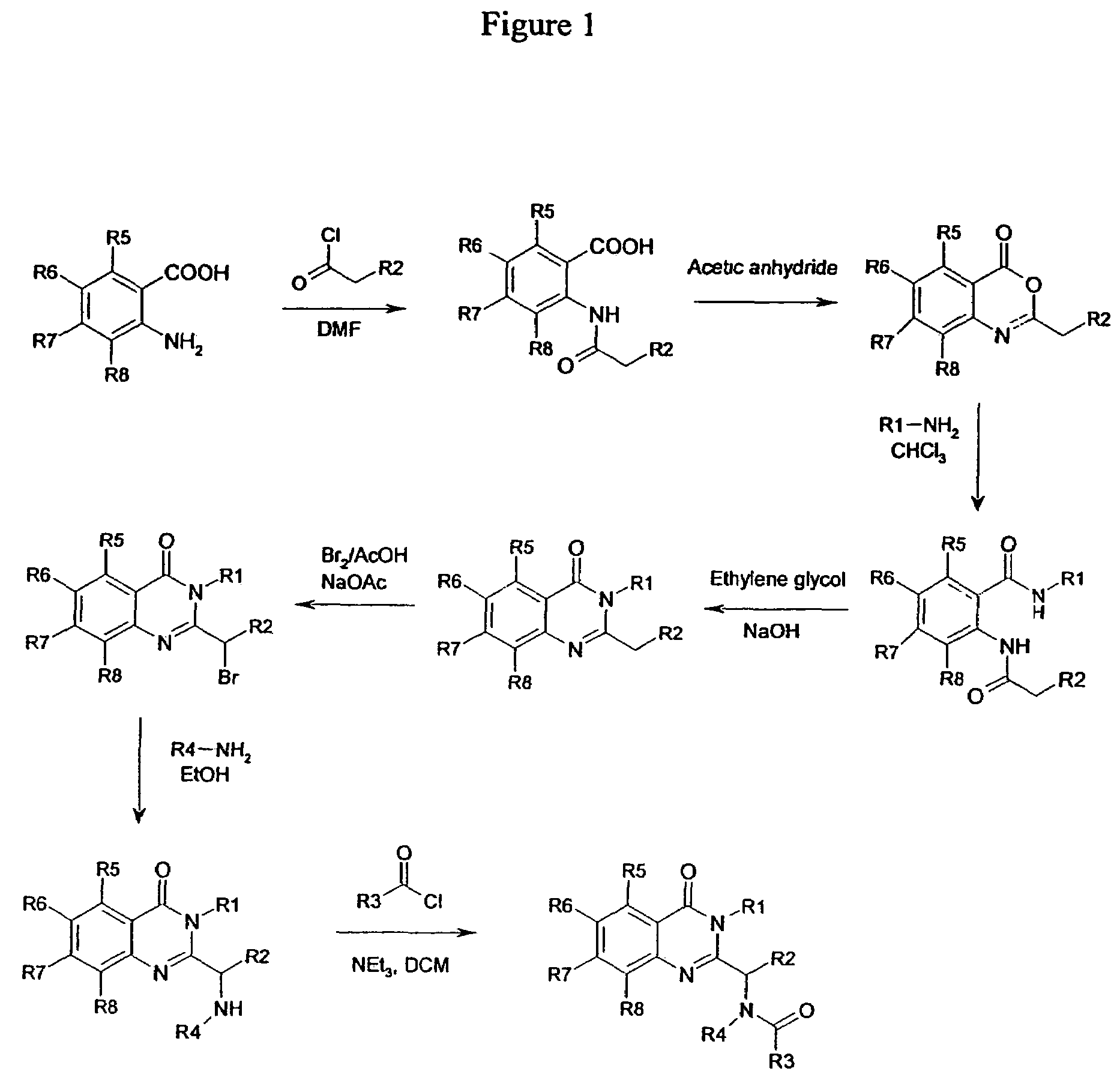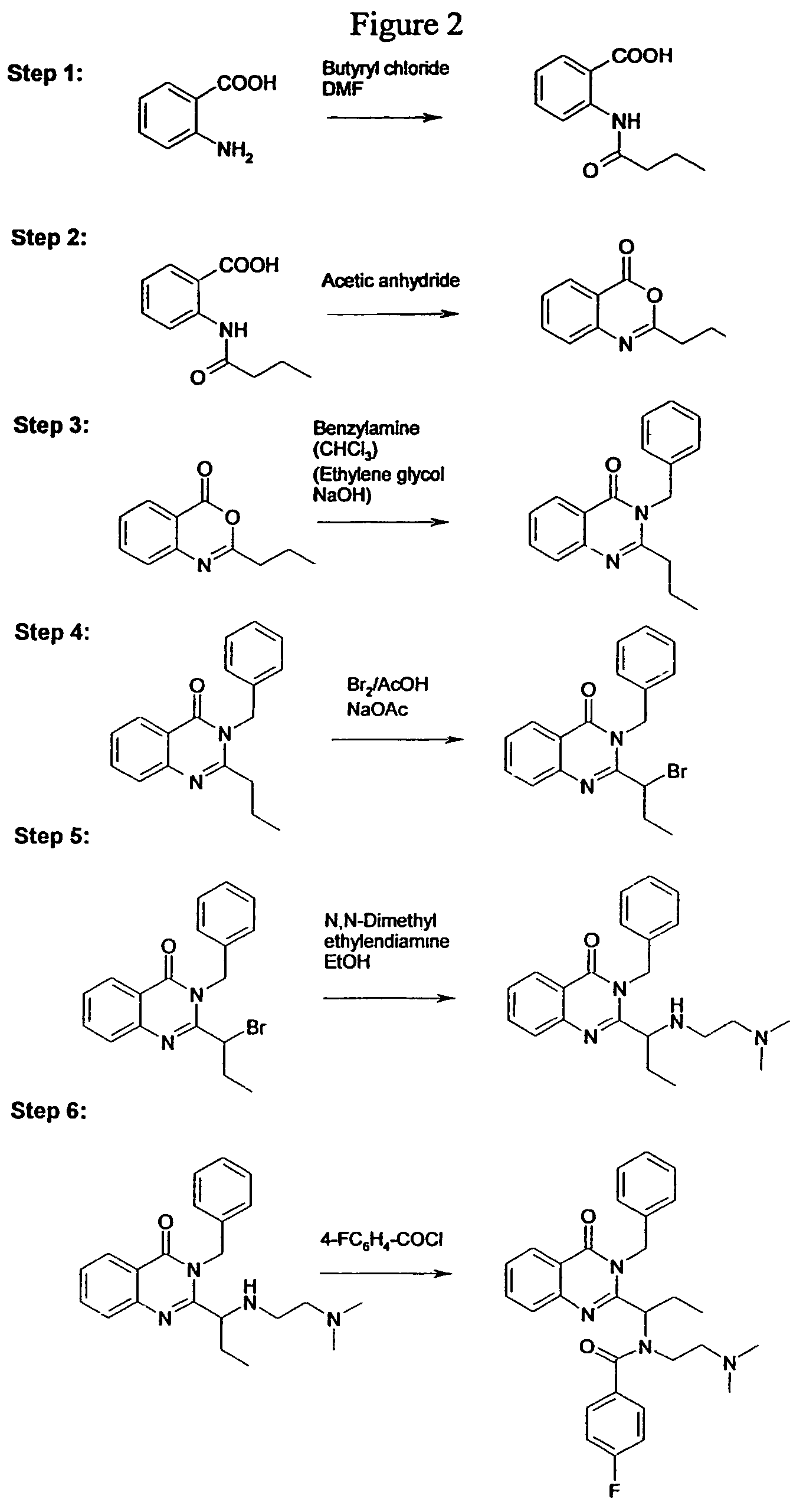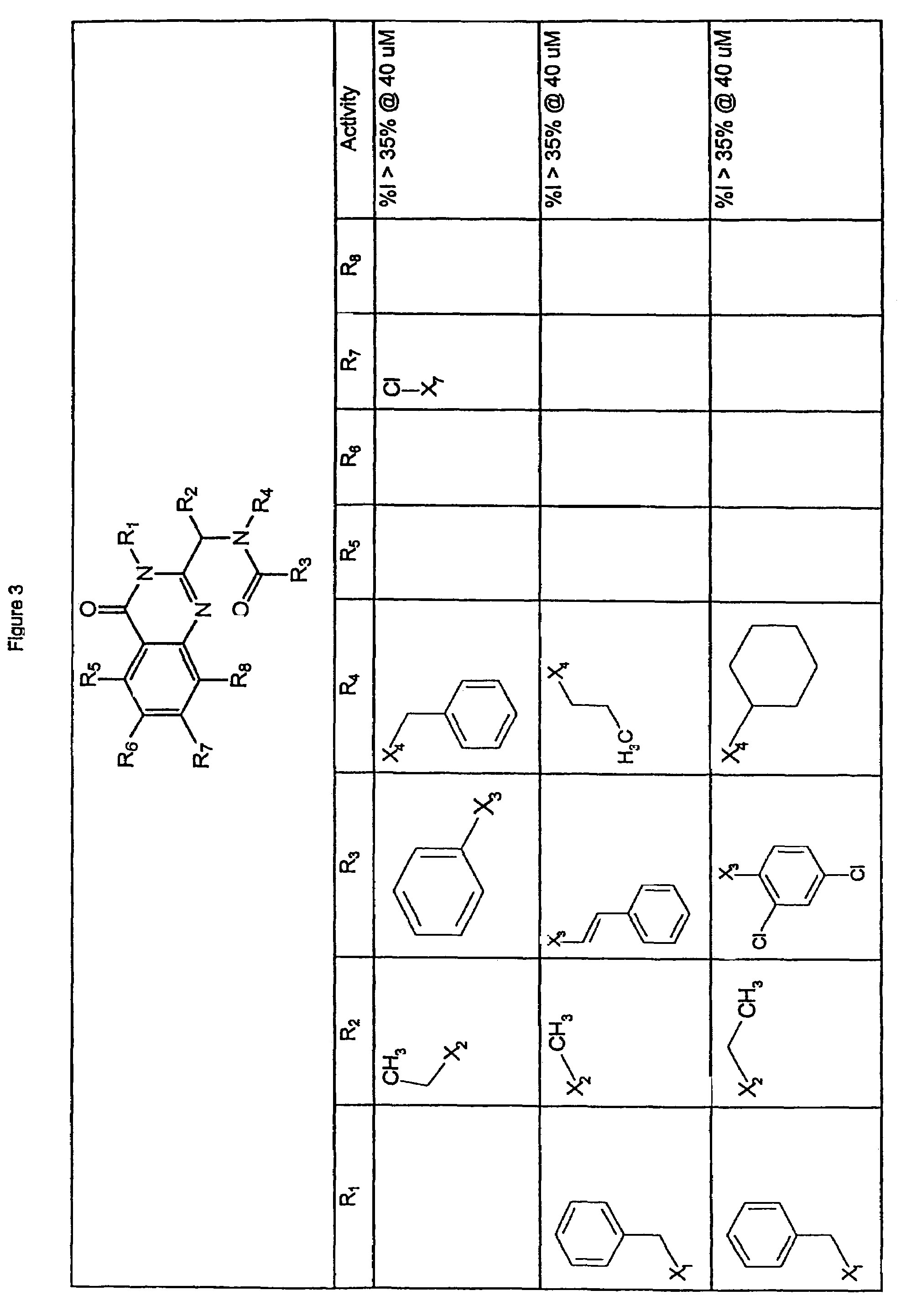Methods and compositions utilizing quinazolinones
a quinazolinone and derivative technology, applied in the field of quinazolinone derivatives, can solve the problems of limiting the usefulness of quinazolinone, inducing cancer cell death, and inhibiting cancer cell division
- Summary
- Abstract
- Description
- Claims
- Application Information
AI Technical Summary
Benefits of technology
Problems solved by technology
Method used
Image
Examples
example 1
Synthesis of Compounds
[0127]The general synthesis is shown in FIGS. 1 and 2.
Step 1: N-butyryl Anthranilic Acid.
[0128]To a three-necked, 500 mL round-bottom flask equipped with a thermometer, dropping funnel, and an efficient magnetic stir bar, was added anthranilic acid (1) (0.5 mole, 68.5 g) and dimethyl formamide (250 mL). To this solution was added butyryl chloride (0.55 mole, 57.1 mL) dropwise at such a rate that the temperature of the mixture did not rise above 40° C. The suspension was stirred vigorously at room temperature for at least an additional 3 h. The mixture was poured into water (2000 mL) and stirred for another 1 h. The precipitated product was collected by filtration, washed with cold water, and dried under reduced pressure over P205, yielding compound 2 (67.3 g, 65%).
Step 2: 2-Propyl-3,1-[4H]benzoxazin-4-one.
[0129]Compound 2 (51.8 g, 0.25 mole) was dissolved in acetic anhydride (180 mL) in a 500 mL round-bottom flask equipped with a magnetic stir bar, a Claisen-di...
examples 2 and 3
Synthesis of Compounds of General Structure 1d
[0134]
[0135]All anhydrous solvents were purchased from Aldrich chemical company in SureSeal® containers. Most reagents were purchase from Aldrich Chemical Company. Abbreviations: DCM, dichloromethane; DIEA, N,N-diisopropylethylamine; DMF, N,N-dimethylformamide; TES, triethylsilane; TFA, trifluoroacetic acid. Array synthesis was conducted in 15×75 mm glass round bottom screw-cap vials contained in a 4×6 array aluminum synthesis block, sealed with a Teflon-lined rubber membrane. Reagents were added and aqueous extractions performed with single or multichannel pipettors. Filtrations were performed using Whatman / Polyfiltronics 24 well, 10 mL filtration blocks. Evaporation of volatile materials from the array was performed with a Labconco Vortex-Evaporator or by sweeping with a 4×6 nitrogen manifold.
example 2 (
Solid Phase Synthesis of a Single Compound)
[0136]STEP 1) 1,3-Diaminopropane trityl resin (Novabiochem, 1.2 mmol / g) (0.20 g, 0.24 mmol) was weighed into a screw-cap vial and 3 mL of a 1:1 mixture of DMF and chloroform was added. DIEA (0.130 mL, 0.72 mmol) and 2-(1′-bromopropyl)-3-benzylquinazolin-4-one (from Example 1) (0.188 g, 0.48 mmol) were added. The vial was sealed, heated to 70° C. and shaken overnight. The resin was filtered and washed (3×DCM, 2×MeOH, 1×DCM, 2×ether) and dried under vacuum. A 27 mg aliquot of resin was treated with 5:5:90 TFA:TES:DCM for 15 min and the mixture was filtered and evaporated, resulting in 8 mg (64% yield) of the quinazolinone-diamine intermediate. LCMS analysis showed >80% purity.
[0137]STEP 2) The resin from Step 1 was swelled in 3 mL of DCM. DIEA (0.130 mL, 0.72 mmol) and 4-bromobenzyl bromide (0.12 g, 0.48 mmol) were added. The vial was sealed and shaken overnight. LCMS analysis of a cleaved aliquot revealed an approximate 1:1 mixture of starti...
PUM
| Property | Measurement | Unit |
|---|---|---|
| temperature | aaaaa | aaaaa |
| temperature | aaaaa | aaaaa |
| temperature | aaaaa | aaaaa |
Abstract
Description
Claims
Application Information
 Login to View More
Login to View More - R&D
- Intellectual Property
- Life Sciences
- Materials
- Tech Scout
- Unparalleled Data Quality
- Higher Quality Content
- 60% Fewer Hallucinations
Browse by: Latest US Patents, China's latest patents, Technical Efficacy Thesaurus, Application Domain, Technology Topic, Popular Technical Reports.
© 2025 PatSnap. All rights reserved.Legal|Privacy policy|Modern Slavery Act Transparency Statement|Sitemap|About US| Contact US: help@patsnap.com



